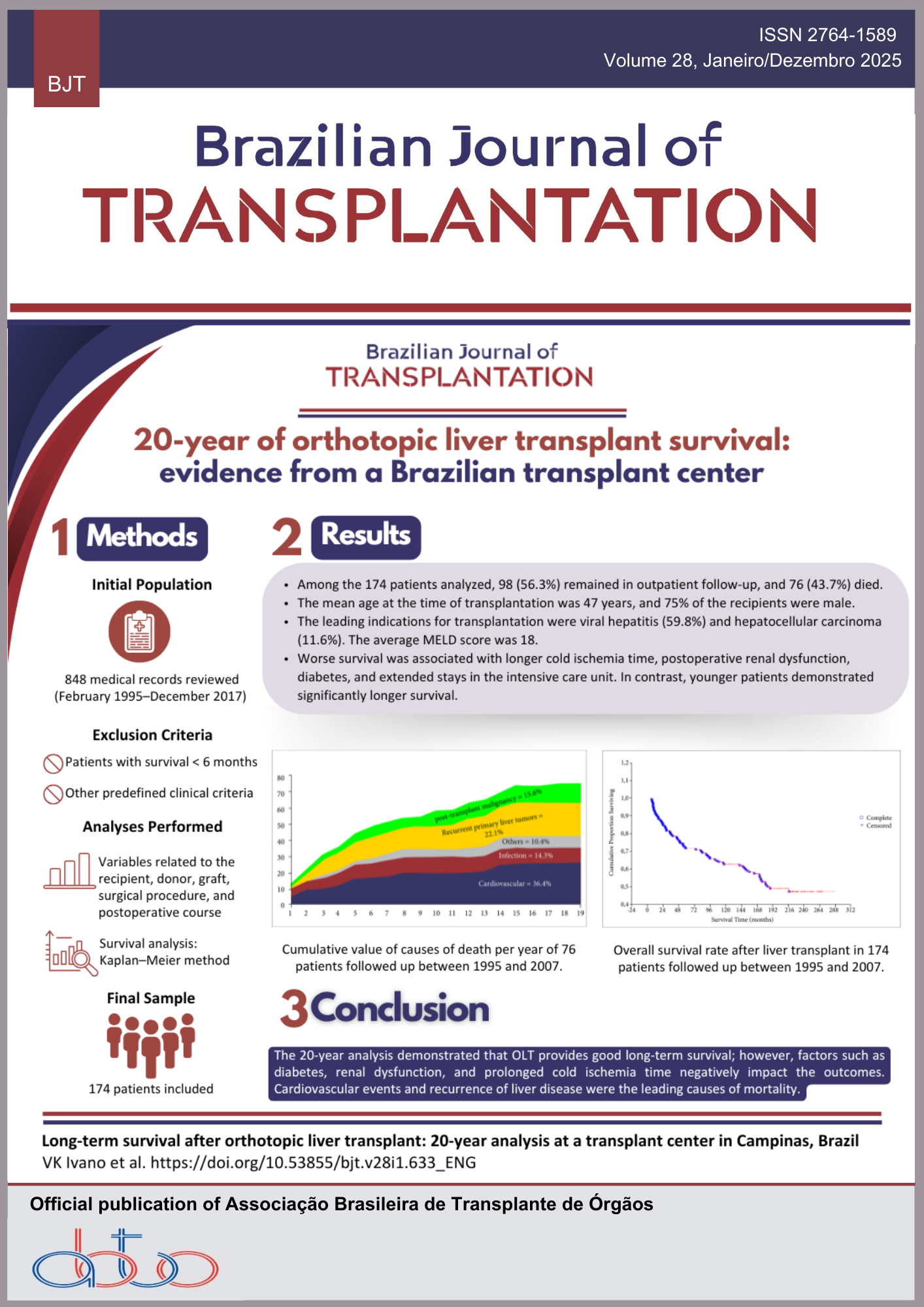General Overview of Causes for Non-Effectiveness and Family Non-Consent in Organ Donation in the State of Rio Grande do Sul
Keywords:
Breaking Bad News; Family Refusal, Brain Death, Donation Rates, Organ transplantationAbstract
Introduction: This ecological study analyzed the causes of failed organ donation and family refusal in the state of Rio Grande do Sul (RS) from 2017 to 2024. Objectives: Using data from state transplant centers, the study aimed to identify weaknesses in the transplant system and suggest improvements.
Methods: Statistical analysis compared donation completion rates in per million population (pmp/year) and family refusal between RS, the state of Santa Catarina (SC), and Brazil. Results: RS had significantly lower donation completion rates (20.3 ± 4.8) than SC (42.3 ± 2.7), though rates were similar to the national average (17 ± 1.6). Family refusal was also higher in RS (27.9% ± 2.7%) than in SC (22% ± 3.3%) (p = 0.003). In RS, the leading cause of donation failure was family refusal (27.93% ± 2.53%), followed by medical contraindications (17.64% ± 5.92%). The total causes of non-completion increased until 2021 (75.6%) and decreased until 2024 (67%). The main reasons for family refusal included the deceased not being a registered donor and family opposition. Conclusion: The study concludes that family refusal is a major barrier to effective organ donation in RS. It recommends professional training in delivering bad news and adopting strategies from the Spanish model to improve donation rates and system effectiveness.
Downloads
References
1. Roza B de A, Garcia VD, Barbosa SDFF, Mendes KDS, Schirmer J. Doação de órgãos e tecidos: relação com o corpo em nossa sociedade. Acta Paul Enferm, 2010; 23: 417-22. https://doi.org/10.1590/S0103-21002010000300017
2. Associação Brasileira de Transplante de Órgãos. Dimensionamento dos transplantes no Brasil e em cada estado (2016-2023). Registro Brasileiro de Transplante. 2016 [2025 Jun 13]; XXX(4). Available from: https://site.abto.org.br/wp-content/uploads/2024/03/RBT_2023-Populacao_Atualizado.pdf
3. Espanha. Ministério da Sanidade. La Organización Nacional de Trasplantes presenta su balance de actividad en 2023. [cited 2024 Out 10] Available from: https://www.mscbs.es
4. Coelho GH, Bonella AE. Doação de órgãos e tecidos humanos: a transplantação na Espanha e no Brasil. Rev Bioet, 2019; 27(3): 419-29. https://doi.org/10.1590/1983-80422019273325
5. Paraná. Secretaria de Estado da Saúde do Paraná. Manual de avaliação da atuação da Comissão Intra Hospitalar de Doação de Órgãos e Tecidos Para Transplante – CIHDOTT. Curitiba: SESA/SGS/CET; 2018. Available from: https://doi.org/10.1016/j.transproceed.2018.10.033
6. De Andrade J, Figueiredo KF. Impact of educational and organizational initiatives in organ donation in a Southern Brazilian state in the last decade. Transplant Proc, 2019; 51(3): 625-31. https://doi.org/10.1016/j.transproceed.2018.10.033
7. Matesanz R, Domínguez-Gil B, Coll E, Mahíllo B, Marazuela R. Spanish experience as a leading country: what kind of measures were taken? Transpl Int, 2011; 24(4): 333-43. https://doi.org/10.1111/j.1432-2277.2010.01204.x
8. De Andrade J, Mahíllo B, Roza B, Domínguez-Gil B, Coll E. Successful implementation of the Spanish model of organ donation in a Brazilian state. Intensive Care Med, 2024; 50(1): 1-2. https://doi.org/10.1007/s00134-024-07460-1
9. Streit S, Johnston-Webber C, Mah J, Prionas A, Wharton G, Casanova D, et al. Ten lessons from the Spanish model of organ donation and transplantation. Transplant International, 2023; 36: 11009. https://doi.org/10.3389/ti.2023.11009
10. Rada AG. Number of organ donors rises by 15% in Spain after doctors are given good practice guide. BMJ, 2011; 342. https://doi.org/10.1136/bmj.d2181
11. Domínguez-Gil B, López JS, Valentín MO, Martín MJ, Coll E, Mahíllo B, et al. Decrease in refusals to donate in Spain despite no substantial change in the population’s attitude towards donation. Organs Tissues Cells Analg. 2010 [cited 2024 Dec. 24]; 13(1): 17-24. Available from: https://www.researchgate.net/publication/324910041_Decrease_in_refusals_to_donate_in_Spain_despit_no_substantial_change_in_the_populations_attitude_towards_donation
12. Scandroglio B, Domínguez-Gil B, López JS, Valentín MO, Martín MJ, Coll E, et al. Analysis of the attitudes and motivations of the Spanish population towards organ donation after death. Transpl Int, 2011; 24(2): 158-66. https://doi.org/10.1111/j.1432-2277.2010.01174.x
13. Lira GG, Pereira AH, Lira GG, Zillmer JGV. Ponderações de familiares sobre a decisão de recusar a doação de órgãos. Acta Paul Enferm, 2012; 25: 140-5. https://doi.org/10.1590/S0103-21002012000900022
14. Roza BA, Almeida TV, Lima AS, Cecatti JG. Doação de órgãos e tecidos: relação com o corpo em nossa sociedade. Acta Paul Enferm, 2010; 23: 417-22. https://doi.org/10.1590/S0103-21002010000300017
15. Rossato GC, Girardon-Perlini NMO, Begnini D, Beuter M, Camponogara S, Flores CL, et al. Donate or not to donate: the view of the family before the organ donation. REME-Rev Min Enferm, 2017; 21. http://doi.org/10.5935/1415-2762.20170066
16. Andrade J. Interview to the Conselho Regional de Medicina de Santa Catarina, Florianópolis; 2024 [cited 2025 Jun 6]. Available from: https://www.crmsc.org.br/campanhadoacao/
17. Feldens TK. Dois ensaios sobre a economia de transplantes de órgãos. Curitiba. Monografia [Especialização em Ciências Sociais) – Universidade Federal do Paraná; 2021.
18. Goiatá SR. A complexa realidade dos sistemas de transplante de órgãos e os desafios na implementação de medidas para aumentar os consentimentos para doação. Anais do Seminário Internacional em Direitos Humanos e Sociedade. 2023. [cited 2025 Jun 6] Available from: https://periodicos.unesc.net/ojs/index.php/AnaisDirH/article/download/8826/6904/23470
19. Central Estadual de Transplantes de Santa Catarina. Relatório de doações e transplantes 2023. 2023. [2024 Set 15] Available from: https://sctransplantes.saude.sc.gov.br/index.php/pt/estatisticas/30-dados-historicos-de-doacao-e-transplante.html
20. De La Rosa G, Matesanz R, Coll E, Domínguez-Gil B. Continuously evaluating performance in deceased donation: the Spanish quality assurance program. Am J Transplant, 2012; 12(9): 2507-13. https://doi.org/10.1111/j.1600-6143.2012.04138.x
21. Westphal GA. A simple bedside approach to therapeutic goals achievement during the management of deceased organ donors–An adapted version of the “VIP” approach. Clin Transplant, 2016; 30(2): 138-44. https://doi.org/10.1111/ctr.12667
Downloads
Published
How to Cite
Issue
Section
License
Copyright (c) 2025 Daniel Felipe Savaris, Darlan Martins Lara, Rudolfh Batista Arend, Natália da Rosa Valério, Victor Luiz Ferreira Kauer

This work is licensed under a Creative Commons Attribution 4.0 International License.









